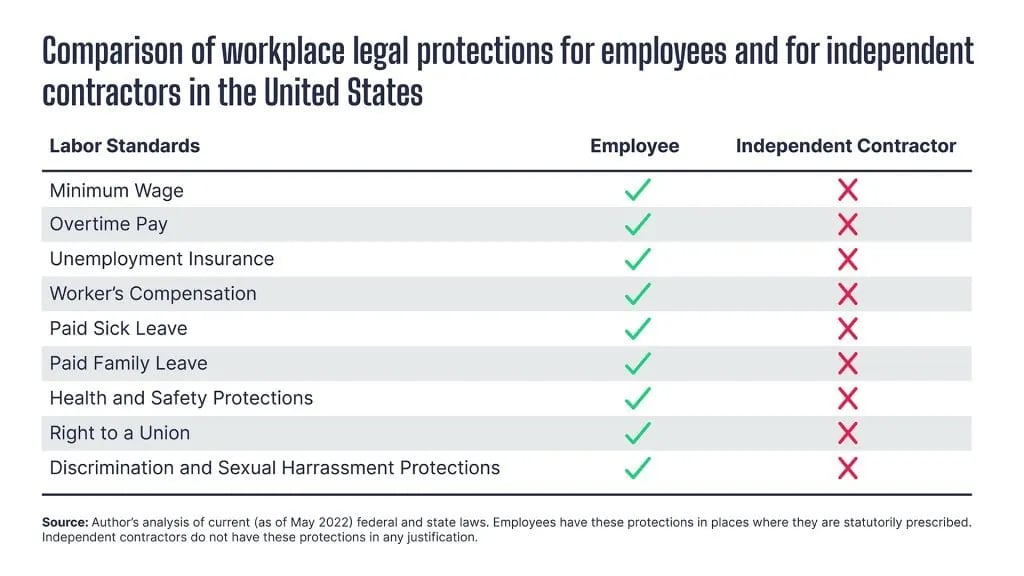What are the Benefits of Hiring Full-Time Employees vs. Contract Workers in Outsourcing?
With the rise of digital nomads and the access to remote work and talent globally, individuals are opting for hiring models that support a more flexible lifestyle. This traditionally falls under the independent contracting or freelancing category. Globally, there are approximately 1.57 billion freelancers, which amounts to about half of the entire known working population in the world.
This shift, often associated with terms like the gig economy or flexible workforce, has seen freelancers encompassing over 36% of the entire US workforce. Additionally, the spike in freelancers was further bolstered by websites and platforms such as Upwork, Fiverr, Freelancer, and Behance, which have made it easier for recruiters and freelancers to connect.
As a result, many businesses are left contemplating whether to hire an hourly contractor or to use an outsourcing partner that employs full-time team members.
Benefits of using an independent contract worker
Flexible hours and location
Freelancers are motivated by a more flexible work arrangement, which means they not only have control of their time but, as remote workers, they can work from anywhere in the world. Whether from the safety of their house or a busy coffee shop, freelancers can clock in whenever they choose to and are not chained to a desk. This freedom, along with technological advancements, was the primary driving force behind the remote or hybrid working arrangements that companies have learned to adapt to in recent years.
Diversified workload and pricing
Freelancers can work on different projects for different clients and be selective about what they work on. They can have a varied pricing structure that is either hourly or project-based, depending on the requirements of the tasks and the time needed to complete them.
Cons of using an independent contract worker
It is important to look at the disadvantages of outsourcing work to freelancers, especially when considering the humanistic aspect of outsourcing.
Data privacy and security risk
Relying on contract workers may pose substantial data privacy and security risks. The decentralized nature of their work, often performed off-site, introduces compliance challenges and potential security vulnerabilities. Freelancers may utilize hardware and software that could fall short of necessary specifications, lacking robust security measures and exposing sensitive information to potential breaches. For business types that deal with sensitive information, it is important to consider the high costs associated with cyber-attacks and the enforcement of global privacy and data protection laws.
Divided interests
Freelancers thrive on versatility, with 95% embracing projects that challenge and enhance their skill set. Remarkably, 63% of freelancers find security in having multiple clients, a mindset that keeps 70% concurrently managing three projects, while some remarkably juggle up to nine different projects at the same time. This can be problematic for businesses that have specific narrative, design, or technological assignments that demand undivided attention.
Unstable income and job insecurity
According to a series of Upwork surveys, the financial terrain for US freelancers is often precarious, with 63% dipping into their savings monthly. This contrasts starkly with traditional full-time workers who resort to their savings only 20% of the time. While freelancers chase a better life rather than a stable income, 77% find themselves not financially better off.
Lack of financial planning and company benefits
The freelance journey lacks the safety net provided by employment benefits. Due to erratic incomes, freelancers struggle to plan for retirement and 42% do not have adequate medical coverage. Even essential benefits like sick leave become precarious for freelancers facing a no-work-no-pay dynamic.
Gender pay gap
A study by Fiverr has found that inequality persists in the gig economy, reflecting a stark gender pay gap. Men are 4.5 times more likely to earn $150,000+ per year than their female counterparts, with over 48% of female freelancers earning less than $25,000 annually. Forbes notes a concerning 32% wage gap between male and female freelancers.

Benefits of using an outsourcing partner with full-time team members
Amplified skills
Outsourcing partners equipped with full-time teams extend access to a diverse and global talent pool, mirroring the versatility offered by hourly contract workers. This diversity becomes a strategic asset, ensuring that businesses can leverage expertise tailored to their specific needs.
Increased flexibility
Entrusting specific business functions to a reliable BPO will free up in-house teams, allowing them to channel their efforts into driving sustainable business growth rather than being bogged down by routine tasks.
Simplified compliance
One of the paramount advantages of partnering with an outsourcing company lies in accessing international talent without navigating the complex nuances of diverse employment regulations. This simplification of compliance procedures ensures seamless integration of global talents into your workforce, knowing that the intricacies and legalities of employing people in different regions are adhered to.
Reduced labor costs
By sidestepping the conventional hiring process, encompassing recruitment, onboarding, and training, businesses effectively curtail both the time and expenses associated with building an in-house team.
Holistic benefits
Full-time team members engaged through outsourcing benefit from a comprehensive array of employment perks mandated by the labor and employment laws of their respective countries. This includes provisions for retirement, life insurance, medical coverage, and various types of leave. This provision of security is a holistic approach that enhances employee well-being.
Career and skills development
The symbiotic relationship with an outsourcing partner facilitates ongoing career and skills development for team members, specifically catering to your needs as a growing business. Access to internal training programs and avenues for career advancement makes outsourcing a sound business strategy, while also being a catalyst for individual growth.
Cultural harmony and values alignment
Strategically structured training, rewards, recognitions, and interactive sessions immerse team members in the company’s culture and values. This immersive experience fosters brand loyalty, aligning team members with a genuine commitment to the overarching success of the business, which ultimately leads to a high retention rate.
Finding the balance between stability and flexibility
Deciding between freelancers and full-time outsourcing partners depends on your business’s specific needs, budget, and long-term goals. Freelancers offer flexibility and specialized skills for short-term projects while outsourcing partners provide stability, legal compliance, and consistent quality for ongoing tasks. Understanding these dynamics is crucial in making an effective hiring decision in today’s fast-paced, globalized business environment.
The advantages of full-time positions include stability, consistency, comprehensive benefits, career development initiatives, and the feeling of being a part of a larger community. Businesses can commit to a longer journey with each new team member. This commitment encourages team members to gain a deeper understanding of the company’s core values, which subsequently leads to loyalty and a sense of belonging.
Migrating freelancers to full-time team members with a BPO
Caraway, an online platform that sells designer cookware and bakeware, was using a team of freelancers through Upwork when their business experienced rapid growth. They approached Boldr to find a longer-term outsourcing solution to help them scale their support processes, but they were adamant about finding a way to transition their freelance team members to full-time team members.
According to Mark Riskowitz, Caraway’s VP of Operations, the biggest challenge of being a young company with high growth, is not understanding the complexity of hiring in different jurisdictions.
“One of the core things we wanted to do was to retain the folks that we had scattered around the Philippines,” explained Mark. “We wanted to give them a new home, a home where they can get access to everything similar to what we have at Caraway. We are pleased because now they have a lot more support from employee benefits, access to healthcare, and all the different things you can provide. Having the resources and the team provided those options for us and made that transition super easy.”
Read: How Caraway leads their CX with empathy
Similarly, Babylist, an expansive online baby registry platform, first established an offshore freelance team to augment its customer support. When Chris Murray joined Babylist as Head of Support, he realized that their talented freelancers lacked adequate IT support and would struggle to meet the overall scalability of their global team’s setup.
The freelance hiring model had complications that would affect performance, which was not a viable long-term solution. Babylist needed a partner to facilitate its human resource functions, such as employee benefits, compensation, payroll administration, and employment taxes while managing an offshore team that operated as an extension of its team.
Boldr was able to retain their entire team by convincing them to switch work models, from independent contractors to full-time team members. With Boldr’s outsourcing solution, Babylist found the balance between high-quality freelance work and full-time contract benefits.
Read: How Boldr helped Babylist to retain their team of Happiness Heroes
Misclassification and the ethical outsourcing solution
As freelancing became a buzzword, it came to light that businesses, such as Uber in 2016, purposely misclassified their workers as independent contractors. This process of purposely categorizing team members as contractors when they should be categorized as full-time team members is done to curb the extra expense of company benefits and worker protection. Not only is this illegal, but it leaves individuals with an uncertain future at the company.
For businesses navigating the uncertainties of the modern workforce, understanding the nuances between full-time employment, independent contractors, and business process outsourcing (BPO) is becoming imperative, especially if they wish to avoid a misstep like incorrectly categorizing their workers. Essentially it’s about finding the right solution that will propel your business towards sustainable growth while considering the human being who is doing the job.
As a business solution, outsourcing presents a unique proposition that combines the stability of full-time employment with the flexibility inherent in freelancing. Organizations can tap into specialized skills without the burden of divided attention, ensuring a dedicated workforce without the overheads of in-house management. This approach streamlines operations and provides access to a global talent pool in a world where adaptability is paramount. This means that a full-time permanent team will always be the best long-term solution for scalability and growth.
Choosing to partner with an ethical BPO services provider will offer the necessary peace of mind that team members are enjoying the benefits of a full-time position, inclusive workplace, and brand loyalty that accompanies a healthy company culture and working environment. Dealing with a B Corp-certified outsourcing company means there will also be a measure of employment transparency, which limits the possibility of worker exploitation or unfair labor practices. If this sounds like the type of engagement you are looking for, let us help build your global team.
James Fouche is the Content Manager at Boldr, as well as an author and a columnist. He is passionate about sharing his love of reading and writing with others.


